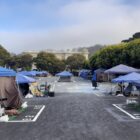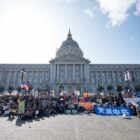California
Lagging Rent Assistance Leaves Tenants Vulnerable to Eviction
With less than two weeks remaining before San Francisco landlords will be allowed to evict tenants for unpaid rents that were due during the pandemic, the state had sent checks to a small fraction of the 3,400 households that have requested rent assistance. Many checks will not arrive soon enough to prevent displacement.
















